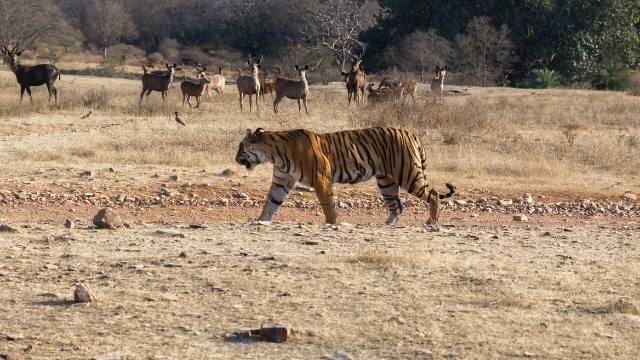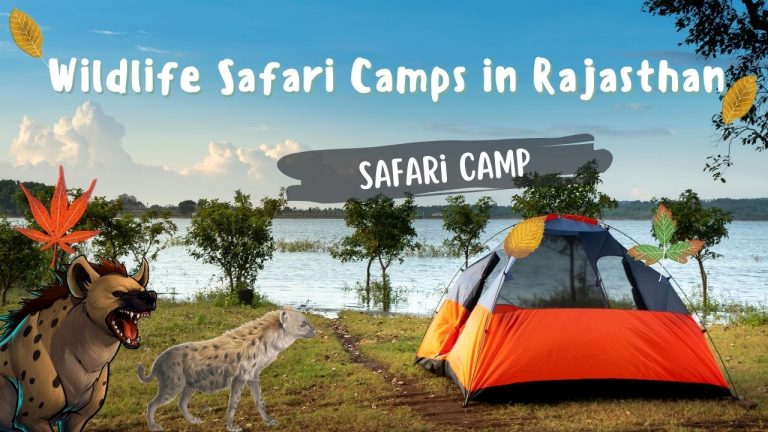Rajasthan is popularly known for its best in arts,crafts,hospitality, forts and various delicacies. In this article I’m going to take you to the 6 best wildlife safari camps in Rajasthan. Enjoy reading.
Visit Wildlife Safari Camps in Rajasthan
1: Band Baretha

The band Baretha is the best place if you are someone who really wants to take a break from the outside busy world.The chirping of birds,the water flowing from the dam, the gayatri mantras chanting by the sages in the river will give you a divine feel. Apart from this you can see beautiful birds and animals as a part of your wildlife safari camps and enjoy their world class facilities in hospitality.
2: Desert National Park, Jaisalmer

One of Rajasthan’s most significant parks, the Desert National Park is located close to the town of Jaisalmer. The national park is one of the biggest national parks in the nation, with an area of 3162 square kilometres.One of the main draws for visitors from all over the world is the national park’s distinctive terrain. Sand dunes make up over 20% of the park. The rest of the landmark is made up of rocky outcrops, salt lake bottoms, fixed dunes, and intermediate sections. It serves as a prime illustration of the desert ecology. The national park is teeming with birds despite its terrain. The endangered Great Indian Bustard and sandpipers are the most often spotted birds in the national park.
Additionally, the Desert National Park is home to a remarkable collection of fossilised plant and animal remains that date back up to 180 million years. The months of November through January are the best for visiting the Desert National Park. In the national park, chinkara, black bucks, hedgehogs, wolves, desert cats, Bengal foxes, and desert foxes are the most often seen wild creatures.
The Great Indian Bustard, a spectacular bird found in extremely small numbers, is the main draw of the national park. The bird is roughly one metre tall, is brown and white in colour, and has long legs and a neck.The Sam Sand Dunes near the Thar Desert and the Desert Museum are a couple of the other attractions close to the Desert National Park.
3: Keoladeo National Park, Bharatpur

Earlier, the Bharatpur Bird Sanctuary was known as the Keoladeo Ghana National Park. In Rajasthan, the sanctuary is a highly well-liked tourist destination that hosts a huge number of migratory birds during the hibernation season. The bird sanctuary is home to up to 230 different avian species, which draws a lot of ornithologists from all over the nation and the world during the migratory season.
The park was designated a protected area in 1971 and added to UNESCO’s list of World Heritage Sites subsequently. As a significant national park in Rajasthan, the bird sanctuary is a man-made wetland.The 379 flower species, 366 bird species, and other creatures all call the bird sanctuary home. One of the world’s richest sites for bird residence is the sanctuary. The sanctuary, which bears the name of the Keoladeo Temple located on its grounds, was established some 250 years ago. One of the top birding locations in the world, the Keoladeo Ghana National Park hosts up to 100,000 people annually. About 45,000 of them are foreigners. Because it is a highly famous tourist attraction in Rajasthan, lodging options have also been set up in and near the sanctuary.
4: Mount Abu Wildlife Sanctuary, Mount Abu

One of Rajasthan’s most popular wildlife sanctuaries is Mount Abu, which is located in one of the nation’s oldest mountain ranges, the Aravalli Hills. It is the home to several wild creatures, birds, plants, and trees and was designated as a wildlife sanctuary in 1980.
The Guru Shikhar peak, Rajasthan’s tallest mountain, measures 19 km in length and 6 km in width, with a height range of 300 to 1722 metres. The most intriguing aspect of the rocks in the area is that they are igneous rocks and that most of them have developed sizable holes as a result of wind and rain.
There are several flora and trees in the wildlife reserve. The sanctuary is home to up to 112 plant families, 449 genera, and 820 species of plants. The sanctuary has up to 81 species of trees, 89 types of shrubs, 28 species of climbers, and 17 species of tuberous plants. The sanctuary also has a diversity of orchid species. The refuge includes bamboo woods in certain areas. Numerous animal species, including lions, tigers, leopards, hedgehogs, porcupines, Indian hares, mongooses, pangolins, bears, wild boars, langurs, foxes, hyenas, jackals, tiny Indian civets, jungle cats, sambhars, and others, may be found in the wildlife sanctuary. There are as many as 250 bird species in this area.
5: Ranthambore

An ideal haven for lovers of nature, Ranthambore. Although its National Park and Tiger Reserve are well known, Ranthambhore is a much-liked tourist destination for a variety of reasons. Ranthambhore is more than simply a well-liked animal habitat because of the undeniably captivating landscapes, castles, and royal remains. So instead of merely admiring the captivating surroundings or feasting your eyes on the lovely escapades of Ranthambhore, participate in numerous more fascinating things that are unquestionably worth your time and money. The most daring activity you may choose is a safari ride, which provides you the chance to see wild animals grazing freely in the forest. You should also consider going on a bird-watching tour.
The Ranthambore Fort, regarded as one of Rajasthan’s most well-known attractions, is among the must-see locations in Ranthambore. The Chauhan kings constructed this fort in 944 AD, and it accurately captures that time period. You may have a mind-blowing experience by visiting this magnificent fort! Another gem that is perfect for those who like a serene environment to find consolation is Surwal Lake. You would undoubtedly gasp in awe at the magnificent sight of this unusual collection of exotic creatures. Near the Padam lake in Ranthambore, Jogi Mahal is another famous location. Amazing sculptures and architecture are well-known features. Along with the fauna, Ranthambore’s culture and customs are extremely important. Celebrate with the magnificent artwork and handiwork produced by rural women working under the fantastic project of Village Women Craft. Additionally, while you’re at Ranthambore, treat yourself to some of Rajasthan’s most delectable meals like Dal Bati churma, Ker Sangri, and Mawa kachori for a flavour that won’t soon leave your taste buds!
6: Sariska Tiger Reserve
One of Rajasthan’s most significant national parks is the Sariska Tiger Reserve, which is located in the Alwar district. It was the State of Alwar’s hunting territory. In 1955, the area was designated as a wildlife reserve, and in 1978, Project Tiger was implemented. In the Sariska Tiger Reserve, there are dry deciduous trees, thorny scrub, and grasslands. The 866 square kilometre park is located 107 kilometres from Jaipur and 200 kilometres from Delhi. The Aravalli Range includes the Sariska Tiger Reserve, which is abundant in minerals like copper.Its population of Royal Bengal Tigers is the Sariska Tiger Reserve’s most alluring characteristic. In addition to Rhesus monkeys, Hanuman langurs, hares, wild boars, chousingha or the four-horned antelope, chinkara, nilgai, sambhar, golden jackals, striped hyenas, caracal, jungle cats, and leopards, it is home to a vast number of other wild creatures. Along with that, it is home to several bird species, including the Great Indian Horned Owl, crested serpent eagle, golden-backed woodpecker, tree pie, sand grouse, bush quail, grey partridge, and peafowl. Additionally, the reserve is home to numerous outstanding historical monuments, like the Kankanwadi Fort, the Pandupol Hills, and the Hanuman Temple on the Pandupol Hill, among others.Additionally, the Sariska Tiger Sanctuary is the first Tiger Reserve in the nation where successful tiger translocation and rehabilitation has taken place. In a 2005 article, a renowned journalist confirmed the Sariska Tiger Reserve’s dwindling tiger population.



